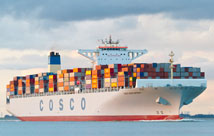Seaspan Achieves Investment Grade BBB- Senior Secured Rating
London, UK, August 11, 2020 – Seaspan Corporation (“Seaspan” or the “Company”), a wholly owned subsidiary of Atlas Corp. (“Atlas”) (NYSE:ATCO), today announced that it has received a Senior Secured rating of BBB- from Kroll Bond Rating Agency (KBRA) and a BB corporate rating. “The credit ratings for Seaspan reflect their position as a global leader in containership leasing,” noted KBRA in announcing the ratings. The assigned ratings carry a stable outlook.
The BBB- rating is attributed to Seaspan’s innovative portfolio financing program (the “Program”), which closed in 2019, and has since grown to over $1.7 billion, representing a central component of Seaspan’s capital structure. With the confirmation of a BBB- investment grade rating, Seaspan plans to pursue further diversification of funding sources that will complement the Program, and reduce the Company’s overall cost of funding.
Bing Chen, Chairman, President and Chief Executive Officer of Seaspan, commented, “We are proud of this major corporate achievement. It is a testament to our resilient business model that despite these challenging global markets, Seaspan is able to deliver growth while enhancing financial stability. This is possible due to the unique competitive advantages provided by Seaspan’s fully integrated operating platform and industry-leading scale. We will continue to focus on credit improvements while we pursue quality growth.”
Ryan Courson, Chief Financial Officer of Seaspan, added, “This credit rating is an important milestone on a path to reshape our balance sheet and achieve an investment grade rating, which we began in 2018. We provided an update at our 2019 Investor Day showing substantial progress towards our Capital Plan objectives, including consolidation of credit facilities and deleveraging. In 2020 and beyond, we intend to further broaden our sources of capital through institutional markets, and shift toward a more flexible unsecured capital structure.”





